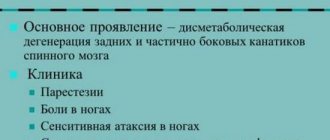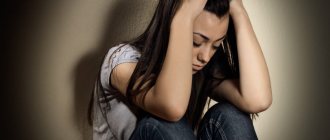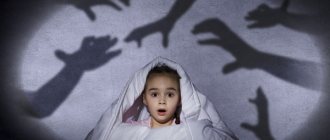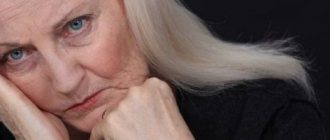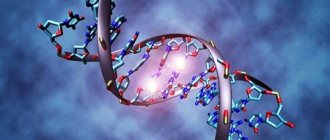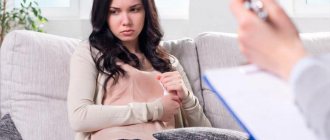Quick navigation: → Exogenous depression and endogenous depression → Biological theory of depression → Endogenous depression is... a hoax?! → Endogenous depression - who benefits? → Is “endogenous” depression curable? → The main principle of treating “endogenous” depression → Instead of a conclusion
Endogenous depression - what is it, what dangers does this diagnosis pose, is it possible to cure it forever, and if so, how? These questions concern the minds of not only clinical researchers, but also everyone who has discovered symptoms of depression in themselves. Let's try together, step by step, to understand such a difficult but important topic.
Exogenous depression and endogenous depression
As they say, you need to know the enemy by sight. Therefore, the desire to learn as much as possible about the disease is worthy of all praise. In the process of searching for information about depression and its types, people quickly discover that depression can be:
- exogenous;
- endogenous.
Exogenous (reactive) depression , as the name suggests (from the Greek έξω - “external”), is a person’s reaction to external stress factors. Those. This type of depression is nothing more than the imprint that difficult events and unfavorable combinations of life circumstances left on the human psyche.
Endogenous depression (Greek ἔνδον - “inside”) depends little on external factors. Its symptoms are the result of abnormalities in the chemical balance of nerve cells—neurons. The anomalies themselves, according to the creators of the theory of endogenous depression, are genetically programmed. It turns out that endogenous depression is not a psychological problem (as is the case with exogenous depression), but an organic one.
The symptoms of both types of depression are almost the same: low mood, loss of the ability to enjoy, slowed thinking and motor retardation. (see also here).
In magazines, on television and on the Internet, we only hear that endogenous depression is a “brain disease” and in order to cope with it, psychotherapy will clearly not be enough. After all, we need to correct the “chemical imbalance of the brain”! How to do it? Obviously, with the help of antidepressant pills. Moreover, apparently, they will need to be taken until the end of time: genetics is genetics...
STOP!!! STOP!!! Don’t rush to label yourself as terminally ill!
Everything that you have read so far about endogenous depression is not all the information about the problem! There is something else that many psychiatrists prefer not to talk about, but it is necessary to know! Just read the article carefully until the end. And only then draw conclusions.
Biological theory of depression
The biological theory of depression (also called the “brain chemical imbalance” theory), which is what attempts to describe the physiology of the brain in depression, looks beautiful and convincing. You can easily find a description of this theory in psychiatry textbooks. We invite you to familiarize yourself with it, albeit in a somewhat simplified (but essentially correct) form.
So, the nervous system is a huge number of nerve cells, neurons. There are nearly 100 billion of them in the brain alone. Neurons transmit nerve impulses from one to another, forming so-called neural networks. The place where two neurons “dock” to each other is called a synapse.
If you enlarge the synapse (see picture), you will notice that the neurons are not touching. Between them there is always a space filled with a special liquid. This space is called the synaptic cleft. It is believed that this is where the dramatic processes that cause depression occur.
How to transmit an impulse from one neuron to another if they do not even touch? It's simple. A neuron that “wants” to transmit information to its neighbor releases special substances - neurotransmitters - into the synaptic cleft. You've probably heard the names of some of them: serotonin, norepinephrine, dopamine...
So, when a sufficient portion of the same serotonin “floats” to a neighboring neuron, the nerve cell calmly transmits the received signal further to its destination. The key word here is ample portion. Since in the absence of a neurotransmitter in the required amount, the nerve impulse will not travel further, but will “get stuck”.
In fact, depression is the result of such numerous “stucknesses,” i.e., improper functioning of the brain. And when we add the prefix “endogenous” to the diagnosis of depression, we mean that something is broken at the cellular level. Figuratively speaking, a certain “factory” in the brain, which should produce serotonin or dopamine of acceptable quality and in the right quantity, does not work properly.
Antidepressants artificially increase the concentration of neurotransmitters in synaptic clefts. This is allegedly the basis of their therapeutic effect.
Endogenous depression is... a hoax?!
The “brain chemical imbalance” theory sounds pretty impressive. But this should not stop us in searching for the grain of truth. There were and are many myths in medicine that look impressive, take for example the myth about vegetative-vascular dystonia (VSD). Let's try to figure it out.
Refutation No. 1. Strange reaction to antidepressants
Anyone who has been prescribed an antidepressant by a doctor can confirm this. The psychiatrist always tells the patient that you should start taking the medicine, but the active substance must accumulate in the nerve fibers. And this takes time - from 3 to 5 weeks of regular use. Only then can you notice improvement.
But neuropsychological data clearly indicate that after taking Zoloft, Paxil and other well-known drugs, the concentration of serotonin becomes “normal” after 3 hours!!! [1] It turns out that changes in mood and improved well-being should occur on the very first day of use. But nothing like that happens - it takes months to recover. And only if you’re lucky, because according to statistics, antidepressants help approximately 50% of patients. And for some, the pills actually make them worse.
A clear flaw in the “chemical imbalance” theory that needs to be explained. The following discussion will help you understand the real reasons for this phenomenon.
Refutation No. 2. Placebo
Pay attention to the results of studies on the use of antidepressants obtained from the University of California, Los Angeles [5]. They claim that beneficial changes in the brain occur due to the patient's belief that changes in the brain should occur over time with regular use of antidepressants.
That is, an important component of antidepressant treatment is the doctor who accompanies the prescription with the words: “The drug will accumulate in the brain for several weeks, and then you will feel better.” A common hypnotic suggestion. So to speak, “word treatment” or psychotherapy in person.
Of course, in this case we are talking about the placebo effect, based on suggestion. Of course, you may object: even if it’s a placebo, what’s wrong with that? The main thing would be to help people!
Not certainly in that way. You can make “honest” - cheap - placebos, and without side effects. Just imagine: drugs that will cost patients pennies! The effect of an inexpensive drug will continue if the doctor dispenses an “antidepressant” with the words: “This is a very expensive medicine, paid for by the state...”
And the billions of dollars that are spent on advertising anti-depression pills could be invested in training doctors in hypnosis or training psychologists. Let them make useful suggestions with knowledge of the matter!
Refutation No. 3. Antidepressants are much less effective than previously published reports
It all started in January 2008, when the New England Journal of Medicine, one of the most respected scientific publications in the medical field, published a study showing that antidepressant drugs had been selectively reported for years. Only articles where the benefits of using medications for depression are obvious are published. Failures are hushed up. Such selectivity is not science, but real advertising, misleading even conscientious doctors with its scientificism. [8]
Then, in the same 2008, after contacting the Food and Drug Administration (FDA), licensing data for popular antidepressants became available: Paxil, Prozac, Celexa, Zoloft, Effexor", "Serzon". It turned out that the basis for approval of these drugs was “minimal effect on the human body, in addition to the placebo effect.” Scientists who studied the licenses in detail [6] concluded that there is insufficient evidence that antidepressants should be prescribed to anyone other than seriously depressed people.
Then, again in 2008, the Canadian Medical Association published the results of a large-scale study in which more than 6 thousand patients with varying degrees of depression took part [2]. 3,700 of them took Paxil, the rest took placebo. It turned out that the effectiveness of Paxil for the treatment of acute depression is the same as when prescribed a placebo.
We, psychologists, who have been working with depression for many years, have every reason to believe that other popular antidepressants will give a similar effect.
Refutation No. 4. Is serotonin not important at all?
If you take brain scans of people who have overcome depression, whether through psychotherapy or medication, the results always show significant changes in the brain. Psychiatrists cite this data as evidence of the effectiveness of drugs, they say, you see: thanks to our drugs, the brain is transformed!
At the same time, an important detail remains behind the scenes: a careful analysis of the same images shows that the changes are not related to the concentration of serotonin. In the fight against depression, the parts of the brain that are responsible for the production of new neurons play a much larger role [7]. It turns out that antidepressants (if you separate the placebo effect) do not act on those parts of the brain that help get rid of depression?
It's not the pills that create new neurons and neural circuits. They are created by the perception, comprehension and implementation of information. New neurons are formed as we learn new skills that allow us to build a better quality of life. It is this kind of training that constitutes high-quality psychotherapy for depression, incl. endogenous.
Really...?
Yes, dear reader, the scientific basis on which the idea of endogenous depression is based is very, very dubious. And the data on the effectiveness of antidepressants also cannot be called objective. This means that the construct “endogenous depression” is nothing more than a myth...
Please note that we are not saying that depression cannot be caused by genetic factors. Probably, depression can still be endogenous, but much less often than is presented in psychiatry. And the role of medications in the treatment of depression is greatly exaggerated. We'll talk about this further.
Tablets for depression - antidepressants, tranquilizers, antipsychotics
By “depression,” many of us often understand simply a “bad mood,” a melancholy state. But this is not true. Depression is a serious mental illness, and mere comfort is not any effective remedy for it. One of the mandatory methods of treating depression is medication. Pills for depression must be selected correctly and carefully, and only a specialist should do this.
Tablets for depression - antidepressants, tranquilizers, antipsychotics.
Other methods
Regular exercise has been proven to be effective. Experts say that classes make sense if they are carried out at the request of the patient. With severe depression, any load seems unbearable, so the method becomes significant during the recovery stage and during the period of remission. Exercise therapy classes are supplemented with acupuncture, massage, and aromatherapy.
Treatment of depression with light therapy is especially effective in the seasonal form of the pathology; it is used to enhance the effect of other techniques. The condition of patients improves after sleep deprivation (staying awake for a day or more), but using this method as the main one is not recommended, since symptoms often return after restoring sleep.
In particularly severe cases, depression is treated using electroconvulsive therapy (ECT). This method is more effective than antidepressants, but can cause memory loss and cognitive decline. Usually the consequences are reversible, however, due to the existing risk and severity of the procedure, ECT is prescribed only if there are compelling indications.
Exercise therapy classes are supplemented with acupuncture, massage, and aromatherapy.
Nootropics and Metabolic Aids
The remedies in this group help to get out of a depressive state that has developed against the background of stress, overwork, encephalopathy, the consequences of injuries and poisoning. By improving the blood supply to neurons and energy metabolism within cells, they contribute to the activation of cognitive functions and memory. The most effective drugs in this group:
Aminalon (GABA)
Piracetam (nootropil)
Pyriditol (encephabol)
B vitamins.
The most effective drugs in this group.
Top 5 rating according to KP
The tablets contain special antibodies that improve tolerance to mental stress. The drug not only reduces irritability and anxiety, but also normalizes cerebral circulation. This improves memory and makes it easier to learn complex skills. Helps the brain cope with lack of oxygen and exposure to toxins.
It is better to discuss taking pills during pregnancy and breastfeeding with your doctor - the effect of the drug has not been sufficiently studied.
+ does not cause inhibition and addiction + improves brain health + reduces anxiety + increases resistance to stress
– not allowed under 18 years old – high price
This drug is usually prescribed as additional support for the brain during constant overstrain: stressful work, difficult studies. The tablets regulate metabolism and improve inhibition processes in the central nervous system. Thanks to this, tension and aggressiveness are reduced.
The drug also reduces the consequences after brain injuries, after alcohol or drug poisoning.
+ increases mental performance + improves sleep + no side effects + can be used during pregnancy and children + low price
– cumulative effect, does not work immediately
The drug is of plant origin, consists of a complex of valerian, hops, lemon balm and others. The herbal complex has a calming effect and is effective not only with anxiety, but also with more severe disorders. For example, with itching, migraines, intestinal diseases, attacks of neurasthenia, which are caused by psychological stress.
The drug contains ethanol - alcohol, which is worth keeping in mind. It is not recommended to take the drug during pregnancy, but for certain indications they take risks. For convenience, there is also a tablet form, but the solution is absorbed and acts faster.
+ natural composition + fights many nervous diseases + improves sleep + tastes good
– possible side effects – it is recommended to stop driving – not allowed until the age of 12 – not for nursing mothers – inconvenient form of administration – cannot be combined with some medications – high price
This drug is one of the “strongest” in our ranking of the best pills for stress and nerves; it is classified as a tranquilizer and antidepressant. Used for anxiety, fear attacks, and sleep disorders. It also alleviates the course of many diseases: asthma, hypertension, arrhythmia.
The drug is especially indicated for vulnerable, suspicious people prone to tearfulness or irritability. Taking pills makes it easier to cope with premenstrual syndrome, as well as “withdrawal syndrome” when suddenly giving up bad habits, smoking and alcohol.
+ protects nerve cells + eliminates anxiety + alleviates depression + fights many nervous diseases + does not cause inhibition or addiction + practically no side effects
– not allowed until the age of 18 – not allowed during pregnancy and breastfeeding – cumulative effect, does not appear immediately – high price
In fact, it is not a medicine, but a dietary supplement, a source of vitamins, magnesium and flavones. Their accumulation has a very mild calming effect and is suitable for minor anxiety as additional support for the body. In case of severe stress and its physical manifestations, the drug may not act immediately. Sometimes you have to take the pills for more than a week before the effect appears.
+ natural composition + reduces anxiety + no side effects + does not cause addiction or drowsiness + low price
– cumulative effect – not allowed under 18 years of age – not allowed during pregnancy and breastfeeding
The drug contains ethanol alcohol, which is worth keeping in mind.
Vitamin therapy and homeopathy for neuroses
Treatment of depression with homeopathy requires a special approach to the choice of medications. Medicines in this group are prescribed if the following indications exist:
- Hysteria: “Tarantula”, “Ignacia”, “Platinum”, “Asafetida”, “Pulsatilla”.
- Signs of neurasthenia: “Indica Cannabis”, “Agaricus”, “Belladonna”, “Phosphorus”, “Stramonium”.
- Hyposthenic neurosis: “Conium”, “Acidum picrinicum”, “Acidum phosphoricum”.
- Obsessive states: “China”, “Silicea”, “Arsenicum album”.
- Psychasthenia: “Causticum”, “Calcium carbonicum”, “Graphites”.
Vitamins for mental disorders play a key role in restoring the central nervous system. When you have depression, your brain needs nourishment. The beneficial substances of group B have the best effect. Due to their lack in the body, vitamin deficiency may develop.
Vitamins such as glycine, ascorbic acid, cholecalciferol, tocopherol, and rutin are also useful for the brain. Good nutrition (oranges, bananas, nuts, dairy products, greens, cabbage, buckwheat, rice) and special multivitamin complexes will help compensate for their deficiency.
For neuroses and depression, medications are prescribed that can reduce the intensity of the symptoms of the disease and prepare the nervous system for psychotherapy. Neurological manifestations should be removed at the first signs of pathology.
For neuroses and depression, medications are prescribed that can reduce the intensity of the symptoms of the disease and prepare the nervous system for psychotherapy.
Antidepressants
Antidepressants are pharmacological drugs that reduce the manifestation of depressive conditions and curb suicidal tendencies.
List of the best drugs:
- Fluoxetine - tablets for depression and stress, improve mood, help fight feelings of fear, and have a stimulating effect. You need to take the medicine once a day in the morning, 1 tablet of 20 mg or 2 tablets of 10 mg, the clinical effect develops after 1-4 weeks.
- Zoloft is one of the strongest antidepressants and is not addictive. During treatment, deterioration in the functioning of the digestive system, heart, and vision abnormalities may occur. You need to take 1 tablet (50 mg) per day, the effect of treatment will be noticeable after 2-4 weeks. A structural analogue is Misol, the drug has a similar therapeutic effect, restrictions for use.
- Remeron is a drug used to treat major depression and has an extensive list of side effects. You need to take the tablets before bed, do not chew them, and drink plenty of water. The dosage is 15-45 mg. The effectiveness of treatment is observed after 1-2 weeks, the duration of therapy is 1 month.
- Selectra is a modern drug for the treatment of depression and panic conditions. Side effects appear during the first two weeks of therapy, then their intensity and frequency of manifestations decrease. The medicine should be taken once a day for 6 months.
- Velaxin is a non-classical antidepressant that accelerates the transmission of nerve impulses to the central nervous system and is prescribed for social and generalized anxiety disorders. Capsules and tablets should be taken with meals once a day at the same time, without chewing. Daily dosage – 75 mg. To avoid the development of withdrawal syndrome, the dose of the drug should be reduced gradually. The duration of the course is 6 months or more. Analogue – Efevelon.
- Adepress - prescribed for various types of depression, bipolar and panic disorders. Dosage – 20 mg per day once, if necessary, the dose is gradually increased by 10 mg per day once a week, the duration of treatment is 4-6 months.
- Valdoxan is a medicine that helps eliminate symptoms of severe and moderate depression and is not addictive. You need to take 1 tablet per day, preferably in the evening. Duration of therapy is six months. Analogue in composition and therapeutic effect - Melitor.
- Azafen, Coaxil - tricyclic antidepressants, prescribed for mild to moderate severity of the disease. The initial dose is 25-50 mg, gradually the dose of the drug is increased to 150-200 mg/day. You need to take the tablets 2-4 times every morning, the last time before bed. The course of treatment is from 1.5-12 months to 1 year.
- Trittico is an antidepressant from the triazolopyridine group, eliminates mental and somatic symptoms of anxiety, manifestations of erectile dysfunction, normalizes sleep, stabilizes the emotional state, and is not addictive. The tablets should be taken before bedtime. When taken twice, a third of the dose is drunk after lunch, the rest in the evening. The initial dosage is 100 mg per day, then it is increased by 50 mg every 3-4 days. The maximum daily dose is 3 tablets.
Important! Before starting to take antidepressants, you should try to get rid of depression and insomnia using non-drug methods - eliminate provocateurs of stressful situations, review your work and rest schedule, master meditation, do yoga or art therapy.
Dosage is 20 mg per day once, if necessary, the dose is increased gradually by 10 mg per day once a week, the duration of treatment is 4-6 months.
Endogenous depression - who benefits?
We recently received a letter from one person who became a mountain in defense of medicines: “But doctors, doctors! Psychiatrists and psychotherapists - they took the Hippocratic oath! They won't cheat! And among them there are many more who believe in the benefits of antidepressants than there are people like you - opponents of medications! And abroad, almost every third person takes antidepressants, which is also not without reason! Don’t engage in slander!”
Do not think that doctors always adhere to ethical standards, are well informed and are responsible for what they do. No matter how it is!
Advertising of antidepressants is in full swing for workers in the medical industry; there are even studies on this topic [4]. The advertising of drugs against depression itself, by the way, is truly unprecedented in its scale. In 1999, pharmaceutical companies in the United States spent 12.1 billion dollars on advertising, in 2003 - 22 billion, 16 billion of which were spent on gifts to doctors, incl. free drug samples. And advertising budgets continue to increase every year.
Yes, pharmaceutical sales representatives regularly give gifts to healthcare professionals that influence their decisions. In what specific forms does bribery occur? Read the wonderful book “How I Sold Viagra,” written on behalf of an honored sales representative of the notorious pharmaceutical company Pfizer. There you will find all the answers. But if in the United States this process is at least somehow restrained by law, then in Ukraine and Russia total self-will reigns.
It's not limited to gifts. Manufacturers of antidepressants pay famous doctors to sign articles written for them by pharmaceutical company employees. In the already mentioned “black” year (for pharmaceutical companies) of 2008, evidence of this was documented and published in the famous “Journal of the American Medical Association” [9].
Evidence of the manipulation of scientific data for profit has sent shockwaves through scientific circles. To date, reputable authors have published entire monographs devoted to fraud in studies of the effectiveness of drugs for depression, as well as inconsistencies in the theory of “disturbed chemical balance of the brain.”
So, the story of endogenous depression, requiring you to take pills for the rest of your life, not only does not have good scientific evidence, but also very similar to a marketing ploy of pharmaceutical companies that gives them multi-billion dollar income. Moreover, the interested party was repeatedly caught red-handed, so to speak.
Is “endogenous” depression curable?
Modern brain scanning technologies clearly show what chemical changes occur in the brain while taking antidepressants. However, these same technologies show [3] that no less significant and useful changes occur in the brain:
- in response to other people's behavior;
- as a result of positive life experiences.
In other words, when a person experiences and sympathizes, gets angry or happy, a chemical synthesis is created in the brain that can relieve depression without the risk of side effects that always accompany the “chemical attack” of the body with antidepressants.
In this sense, “endogenous” depression is very different from diabetes. In diabetes, the patient is forced to inject insulin because it is not produced in the body, and there is no way to force pancreatic cells to start producing it. It's either depression. A person with depression has not lost the ability to naturally regulate their brain chemistry. It makes no difference whether you call depression endogenous or exogenous.
The changes that we hope to happen with medication can also come with other, less risky treatments... The doctor prescribing antidepressants must be clear that they are no more effective than good psychotherapy. M. Yapko. World-renowned hypnotherapist, specialist in the treatment of depression [1]
Thus, depression is not a death sentence. We believe that endogenous depression can be cured permanently. Perhaps, with the exception of only a few particularly advanced cases.
Antidepressants are most effective for severe depression
January 08, 2010
An analysis of data on a group of patients taking antidepressants over the past thirty years showed that patients with mild to moderate depression may have minimal or no effect from taking these medications. However, the benefit of antidepressants for patients with severe depression was significant.
Researchers from the University of Pennsylvania, USA, found that most patients prescribed antidepressants do not benefit significantly from such treatment. Scientists led by psychologists collected data from studies that compared the effectiveness of various dietary supplements and medications to treat depression compared with placebos. The studies involved adult patients undergoing outpatient treatment that lasted at least six weeks. The researchers quantified depression severity before and after treatment using the standard Hamilton scale.
The scientists found that the differences between the effectiveness of medications and placebos were greater the more severe the form of depression patients suffered from. This suggests that doctors who prescribe treatment for patients with mild or moderate depression should take into account the fact that pharmaceutical drugs have not been proven to be effective in these stages of depression, so it makes sense to offer alternative forms of treatment - psychotherapy, self-therapy or physical exercise.
“Antidepressants are the best that have been created against severe forms of depression today. However, we do not yet have evidence that these drugs have any significant therapeutic effect in less severe cases of depression,” said study leader Robert DeRubeis, chair of the psychology department at the Pennsylvania School of Arts and Sciences. USA.
“For very severe depression, the benefits of medication are clear and compelling,” says Jay Fournier, a doctoral candidate in the department of psychology at the University of Pennsylvania. “But the results we obtained for other cases showed how important it is that the patient himself takes an active part in therapy, regardless of the severity of the disease. Even a placebo helps most people, and while we don't yet fully understand how this mechanism works, we do see that if a patient takes their depressive symptoms too seriously and worries about their mental health, it makes things much more difficult.”
The main principle of treating “endogenous” depression
Depression has causes. Over the years, a considerable number of people with “endogenous” depression have passed through us. And never, we emphasize: NEVER, have we ever met a person whose depression arose on its own, as a result of some internal factors, invisible to the eye of a qualified psychotherapist.
But unfulfilled hopes, painful relationships - we encounter this in every case of endogenous depression. Antidepressants do not remove any of these causes. A quick cure for depression with a pill—without the effort of making drastic changes in your life, without learning the skills to be more effective—is a false hope instilled by pharmaceutical companies.
A depressed person always has characteristic features of behavior and thinking, life habits that can lead even the strongest person to depression in a short time. It may surprise you, but among the mechanisms is the “take a pill and wait for the medicine to work” attitude. Passive waiting and isolation are not the best friends in the fight against depression.
Most doctors and health care workers want to help people cope with depression... But what they don't realize is that every time they write a prescription, they are admitting they are helpless. Every time they prescribe antidepressants, they suppress the ability to overcome difficulties in a person, which they are supposed to develop in him. Joanna Moncrieff, author of Myths in Drug Treatment [1]
Given the above, the task of a psychotherapist is to find the mechanisms of depression, the bricks that make up the building of depression. Then you need to sequentially disassemble it and build a new, healthy one. We assure you that although this is not an easy task, it is doable!
THE FIRST STEP IN TREATING DEPRESSION SHOULD BE WITHOUT PILLS! What instead? Natural Antidepressants: Healthy emotions of anger, joy, excitement, anticipation and even excitement that are born in friendships and family relationships, creativity, and the production of socially significant products.
Which anti-depression pills to choose?
Depression is a medical diagnosis, do not confuse it with stress or overwork. Before you take pills for depression, you need to be diagnosed with this disease. If you have constant neuroses and fatigue, you should consult your doctor who can make an accurate diagnosis. But sometimes you can independently identify the signs of depression at home.
If you have constant neuroses and fatigue, you should consult your doctor who can make an accurate diagnosis.
